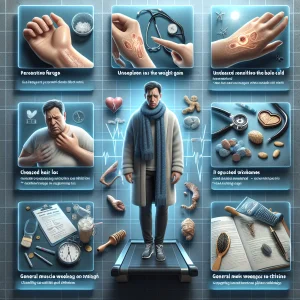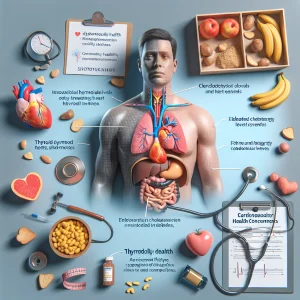Uncover the Critical Health Risks Associated with Hypothyroidism in Men
Hypothyroidism in men represents a serious health condition stemming from the thyroid gland’s failure to produce sufficient levels of crucial hormones like thyroxine (T4) and triiodothyronine (T3). These hormones are essential for regulating numerous physiological processes, including metabolism, maintaining energy levels, and enhancing overall vitality. Although hypothyroidism affects both genders, men often face unique symptoms and complications that can drastically diminish their quality of life. Understanding the nuances of this condition is vital for effective management and treatment strategies.
Identifying the specific symptoms associated with hypothyroidism is crucial for implementing effective treatment and management strategies. Men may frequently overlook the signs of this condition due to their often subtle nature, mistakenly attributing symptoms to factors such as stress, lifestyle changes, or natural aging. Such misinterpretations can lead to persistent discomfort, additional health issues, and a significant decline in overall well-being if not addressed promptly. Therefore, early detection is essential for achieving optimal health outcomes and enjoying a fulfilling life.
The causes of hypothyroidism are varied, including autoimmune disorders like Hashimoto’s thyroiditis, medication side effects, or complications from radiation treatments. Early identification and comprehension of symptoms are critical for timely intervention, which can lead to improved health conditions and a better quality of life.
Essential Insights into Hypothyroidism Every Man Must Be Aware Of
- Hypothyroidism in men indicates insufficient production of thyroid hormones by the gland, resulting in a range of physical and psychological health challenges.
- Physical symptoms may surface as chronic fatigue, unexpected weight gain, hair thinning, and diminished muscle strength. Health risks include elevated cholesterol levels, a greater likelihood of developing heart disease, and potential onset of diabetes.
- The emotional and psychological ramifications of hypothyroidism in men can lead to depression, anxiety disorders, and cognitive impairments, significantly diminishing overall life satisfaction.
- This condition can adversely affect sexual health, leading to reduced libido, erectile dysfunction, and potential fertility challenges.
- Men with hypothyroidism often face struggles with weight management since the condition lowers metabolic rates, complicating weight loss efforts and necessitating tailored dietary and exercise regimens.
 Identifying the Physical Symptoms and Health Risks Linked to Hypothyroidism
Identifying the Physical Symptoms and Health Risks Linked to Hypothyroidism
The physical symptoms associated with hypothyroidism can vary greatly among men. Those affected frequently report enduring fatigue, unexplained weight gain, increased sensitivity to cold, and generalized muscle weakness. You might feel drained even after a full night’s rest or struggle to lose weight despite adhering to a healthy diet and maintaining a regular exercise routine.
Such troubling symptoms can lead to self-doubt regarding your health choices and fitness efforts. Moreover, hypothyroidism may present less obvious symptoms, such as changes in skin texture—like dryness or pallor—and noticeable hair loss or thinning. Timely intervention for these concerns is imperative for effective management and enhanced health.
Additionally, a slowed heart rate may occur, contributing to feelings of lethargy and reduced endurance during physical activities. The cumulative effects of these physical symptoms can significantly disrupt daily life and overall functionality. Therefore, seeking medical evaluation is vital if you suspect that hypothyroidism could be influencing your health.
Addressing the Mental and Emotional Challenges Associated with Hypothyroidism
The mental and emotional consequences of hypothyroidism often remain unnoticed, yet they deserve considerable attention. As thyroid hormone levels drop, you may experience mood fluctuations, increased feelings of depression, or heightened anxiety. These emotional changes can lead to irritability and fatigue, which strain personal relationships and diminish overall life satisfaction.
Research underscores the complex interplay between thyroid function and mental health, highlighting the need to acknowledge this connection for effective management. Cognitive functions may also be impaired due to hypothyroidism, resulting in what many refer to as “brain fog.” You might find it challenging to focus, forget small tasks, or feel mentally sluggish, particularly in fast-paced situations where clarity is vital.
Recognizing these cognitive and emotional symptoms as integral components of hypothyroidism is essential for advocating appropriate medical interventions. For further insights into the connection between hypothyroidism and mental health, explore resources provided by the Mayo Clinic.
 Understanding the Significant Effects of Hypothyroidism on Men's Sexual Health
Understanding the Significant Effects of Hypothyroidism on Men's Sexual Health
Hypothyroidism can profoundly influence sexual health in men, leading to a range of complications. Diminished levels of thyroid hormones may result in lowered libido, erectile dysfunction, and even infertility. You might notice a substantial decrease in interest in sexual activity or encounter difficulties in achieving or sustaining an erection.
These sexual health challenges can be distressing, often resulting in feelings of inadequacy, frustration, or anxiety within intimate relationships. The hormonal imbalances caused by hypothyroidism can also disrupt testosterone levels, complicating the intricate dynamics of sexual health. Low testosterone may further contribute to increased fatigue, mood swings, and decreased sexual desire, creating a challenging cycle that can be hard to break.
It is crucial to openly discuss these sexual health concerns with your healthcare provider to explore effective treatment options aimed at restoring both thyroid function and sexual wellness, ensuring a holistic approach to your overall health.
Effective Strategies for Managing Weight in the Context of Hypothyroidism
Weight management can pose a significant challenge for men diagnosed with hypothyroidism. The metabolic slowdown associated with low thyroid hormone levels can hinder your attempts to lose or maintain a healthy weight. Despite consistent exercise and a balanced diet, you may feel as though shedding unwanted pounds is an insurmountable task.
This ongoing struggle can lead to discouragement, fostering feelings of frustration or hopelessness regarding weight loss efforts. Understanding the connection between hypothyroidism and weight gain is essential for formulating effective strategies. Collaborating with a healthcare provider can help you develop a personalized plan that addresses both thyroid health and weight management goals.
This collaborative approach may involve modifying medications, adopting dietary changes, and integrating specific exercise routines designed to enhance metabolism while accommodating your energy levels.
 Examining the Link Between Hypothyroidism and Cardiovascular Health Risks
Examining the Link Between Hypothyroidism and Cardiovascular Health Risks
The relationship between hypothyroidism and cardiovascular health is a major concern for men with this condition. Insufficient thyroid hormone levels can lead to elevated cholesterol levels, increasing the risk of heart disease over time. It is important to recognize that the fatigue and lethargy commonly associated with hypothyroidism may not only signify the condition itself but could also indicate underlying cardiovascular issues that warrant attention.
Regular cardiovascular health assessments are essential for individuals dealing with hypothyroidism. Your healthcare provider may recommend lifestyle adjustments, such as adopting a heart-healthy diet rich in fruits, vegetables, whole grains, and lean proteins. Moreover, participating in regular physical activity that aligns with your energy capacity can bolster thyroid function and enhance cardiovascular health. By proactively addressing both thyroid health and cardiovascular fitness, you can significantly reduce the risk of further complications.
Investigating the Impact of Hypothyroidism on Male Fertility
Fertility challenges represent another critical issue linked to hypothyroidism in men. Low thyroid hormone levels can disrupt the delicate hormonal balance necessary for sperm production and overall reproductive health. If you encounter difficulty conceiving, it is vital to contemplate how your thyroid function may be influencing your fertility journey.
Effectively managing hypothyroidism through appropriate treatment can bolster overall health and heighten the chances of successful conception. Collaborating with a knowledgeable healthcare provider who comprehends the intricate relationship between thyroid function and fertility is essential for devising a comprehensive strategy that addresses both aspects. This may include regular hormone level monitoring through blood tests and adjusting medications to optimize reproductive health.
Comprehensive Strategies for Managing and Treating Hypothyroidism in Men
Successfully managing hypothyroidism necessitates a holistic approach that incorporates regular monitoring through blood tests, diligent medication management, lifestyle changes, and transparent communication with healthcare professionals. Blood tests are vital for diagnosing hypothyroidism, as they evaluate key indicators such as Thyroid-Stimulating Hormone (TSH) and T4 levels. Elevated TSH levels typically suggest an underactive thyroid, while low T4 levels confirm the diagnosis.
Upon diagnosis, treatment usually involves hormone replacement therapy using synthetic thyroid hormones, such as levothyroxine. This medication aids in restoring normal hormone levels, alleviating many symptoms associated with hypothyroidism. Consistent follow-up appointments are crucial for assessing treatment efficacy and making necessary adjustments according to blood test results.
In addition to medication, lifestyle modifications—such as a nutrient-rich diet that supports thyroid health with adequate iodine, selenium, and zinc—can prove beneficial. Incorporating regular exercise tailored to your energy levels can also help manage symptoms while improving overall well-being. By actively participating in your health management through education, collaboration with healthcare providers, and lifestyle changes, you can lead a fulfilling life despite the challenges posed by hypothyroidism.
Frequently Asked Questions About Hypothyroidism in Men
What constitutes hypothyroidism in men?
Hypothyroidism in men refers to a condition characterized by insufficient thyroid hormone production, leading to a metabolic slowdown and various health complications.
Which symptoms are commonly observed in men with hypothyroidism?
Typical symptoms of hypothyroidism in men include ongoing fatigue, weight gain, cold sensitivity, dry skin, constipation, muscle weakness, and feelings of depression.
How is hypothyroidism diagnosed in men?
The diagnosis of hypothyroidism in men is made through blood tests that measure levels of thyroid-stimulating hormone (TSH) and thyroxine (T4) in the bloodstream.
What factors contribute to the onset of hypothyroidism in men?
The primary cause of hypothyroidism in men is often an autoimmune disorder known as Hashimoto’s thyroiditis. Other contributing factors may include thyroid surgery, radiation therapy, and specific medications.
What treatment options are available for men diagnosed with hypothyroidism?
Men experiencing hypothyroidism typically receive treatment through synthetic thyroid hormone medications, such as levothyroxine, to replenish deficient hormones and restore normal thyroid function.
Can hypothyroidism lead to further health complications in men?
If untreated, hypothyroidism in men can result in complications such as heart disease, fertility challenges, and mental health disorders. Seeking appropriate treatment is essential to minimize these risks.
This Content Is Sponsored By: Thyroid Testing UK
Hypothyroidism in Men: The Impact On Health Was First Published By https://bloodtest.co.uk
Find Us On Facebook: EZ Blood Tests
The Article: Hypothyroidism in Men: Health Implications Explored appeared first on: https://ezbloodtest.com
The Article Hypothyroidism in Men: Exploring Health Implications Was Found On https://limitsofstrategy.com
The Article Hypothyroidism in Men: Health Implications Uncovered First Appeared ON
: https://ad4sc.com

